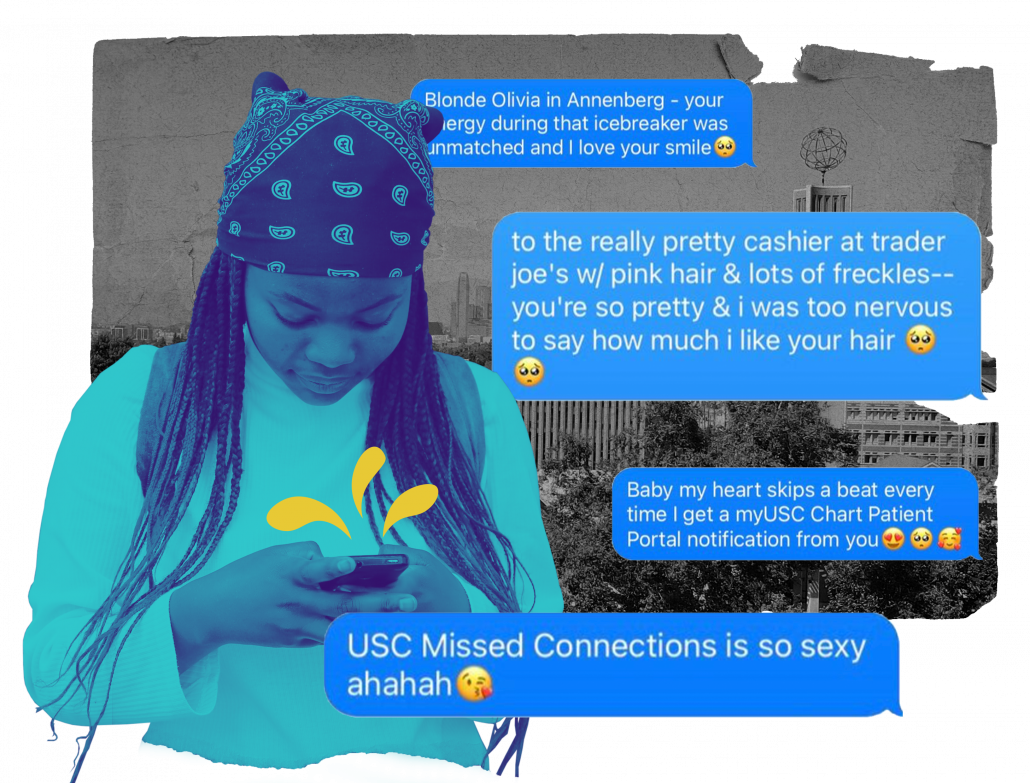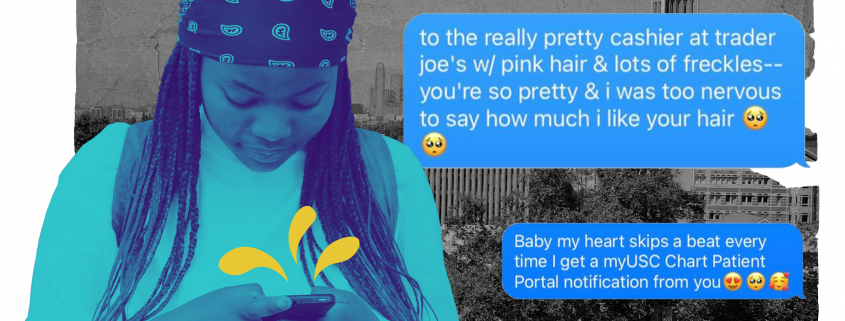Digital admirers take to Instagram

The appeal of anonymity has only been exacerbated by the past year’s reliance on Zoom courses. Without the ability to bare their hearts to their crushes in person, many USC students publicly pined for their remote crushes on @usc.missedconnections, an Instagram page which now boasts over 5,800 followers.
Thousands of students have used the page’s anonymous submission form to express their interest in the students they keep pinned to their Zoom window during online classes, Trader Joe’s and Dulce employees with impressive style and professors they’re secretly crushing on.
The page was created by sophomores Will Domke and Calvin Mattson in October 2020, with Domke lately serving as the main administrator. The two SDA students now receive anywhere from 20 to 30 submissions per day. If you’ve ever submitted a confession and didn’t see it posted, don’t feel personally offended. The page has over 700 submissions on backlog from past semesters. Domke has even resorted to deleting old submissions to keep posts fresh.
Domke and Mattson, majoring in acting and theatre, respectively, met online while looking for roommates for the 2020-2021 school year. When a conversation on the pair’s mutual acceptance into Emerson College shifted to the school’s confession page, Domke and Mattson figured a similar one would do well at USC.
“When we started it, we literally made up the first few submissions,” Domke said. “We were like, we’re going to fake them and so people will be more comfortable with sending in real ones.”
The pair anticipated they would have to do that for a while but got a flurry of posts from Trojans looking to make connections. They still detail, however, receiving submissions, this time from the student body. People often submit them for themselves and their friends.
“There was this one guy from some frat — I don’t remember which one — but he kept sending things in about like, blah, blah, blah, in this frat,” Domke said. “And I was like, ‘there’s no way.’ I just stopped posting ones from him. Sorry to him. Maybe you just have a bunch of admirers!”
The two promised their rapidly growing following a face reveal at 5,000 followers but eventually forgot about it.
“This can be our unofficial admin reveal, our soft launch,” Domke said about the article.
According to Domke, the popularity of the confession page can largely be attributed to people’s need to live vicariously through the secrets of others.
“It’s fun to read things that people have admitted that are maybe a little bit embarrassing,” Domke said. “People love rumors, and this is a place where you could just live vicariously through other people’s little crushes and rumours.”
The page’s popularity hasn’t just drawn attention from students. Domke’s, along with other college confession pages, has garnered coverage from major news networks.
“We did a little interview for the Los Angeles Times. We were in the print edition,” Domke said. “My mom sent me the article. She was like, ‘Did you hear about this?’”
Despite the page’s popularity, secret confessions aren’t always well-received. One post on the page expressed users’ concerns over triggering elements of some posts and received support in the comments. It especially raised concerns over those that contain sexually aggressive language.
Another post on the page featured someone who indicated they were a resident assistant confessing their interest in a former resident of theirs.
Junior Jeniffer Velazquez commented on the post, half-jokingly telling the student to “run.”
“When you are a person of authority and have some kind of attraction toward a person that [you’re] supposed to be helping, especially an RA — these are most likely students that are fresh to college — there’s just a weird advantage in that situation,” Velazquez said.
After reflecting on the harms of giving these people a platform, Domke and Matthison have devoted more thought into minimizing sexually aggressive comments and analyzing the dynamics of sexual speech. They pay special attention to the dynamics of sexual situations described.
“I try to think about the language that [the person] uses and who is acting upon who,” Domke said. “So, if someone is like, ‘rail me,’ then I’m like, OK … that’s someone asking someone to act upon them. That’s different [from] them being like, ‘let me hit.’ It’s very pedantic, but that is something that I think about; like if someone is asking for someone to do something to them as opposed to the other way around, then I’m generally more cool with it.”
The page has especially become more cautious about publishing posts where students comment on others’ bodies.
“It could make someone feel really weird. We have moved away from that kind of stuff this semester,” Domke said. “But if we still receive enough of those submissions, it would be dishonest not to post some of them. If people are creative with it, I’m more inclined to post it.”
Some think that when students tag those that appear in the post, much harm is already done. A student who wished to remain anonymous out of concerns for privacy and safety said a large concern of theirs is that this trend can expose subjects’ personal information to people they would rather remain unknown to.
One way Domke and Matthison respond to these criticisms is by deleting posts at subjects’ request, without question.
“We’ve had some people be like, ‘hey, can you take this down? It’s about me,’ and then we just take it down. We have to. Why would you not take it down?” Domke said. “We always repost without the confession, and I do feel annoyed sometimes, but I just have to do it.”
In Domke’s own words, confession pages “can, as documented in so many shows, very quickly become bad and toxic.” Domke dedicates just five to 10 minutes to each post, but the real challenge has been taking on the responsibility of critically thinking through issues of privacy, consent and safety. Through these guidelines, Domke hopes to maintain the page’s most important value: that these posts are fun and provide comedic relief to the USC community.
Domke hopes to continue the page after graduating, and based on the popular reception, it seems like students will continue to enjoy reading these secrets.
“Hopefully, we’ll find people to take it over,” Domke said. “But I don’t even know if Instagram’s even going to be popular in three or fours years. So I’m just kind of going with it. I’m happy with where we are.”
Nandini Mony contributed to this article.

